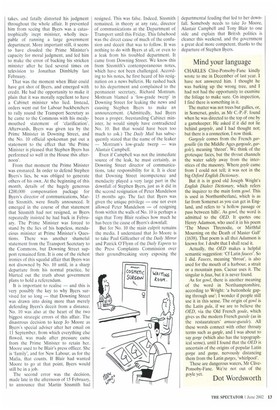Mind your language
CHARLES Clive-Ponsoby-Fane kindly wrote to me in December of last year. I have not answered him. I thought he was barking up the wrong tree, and I had not had the opportunity to examine the foliage to make sure. On inspection, I find there is something in it.
The matter was not trees but gullies, or, in Somerset, goyles, as Mr C.-P.-F. found when he was directed to the top of one by a gamekeeper. He asked if it did not lie behind gargoyle, and I had thought not; but there is a connection, I now think.
Gargoyle comes from the French gargouille (in the Middle Ages gargoule, gargole), meaning 'throat'. We think of the grotesque faces, but the throat channels the water safely away from the interstices of the masonry. Where goyle came from I could not tell; it was not in the big Oxford English Dictionary.
But it is in good old Joseph Wright's English Dialect Dictionary, which refers the inquirer to the main form gowl. This is used in Northumberland, which is as far from Somerset as you can get in England, and refers to 'a hollow passage or pass between hills'. As gowl, the word is admitted to the OED. It quotes one Henry Adamson, who used it in his poem 'The Muses Threnodie, or Mirthful Mourning on the Death of Master Gall' (1638). That poem is all that Adamson is known for. I doubt that I shall read it.
Actually, the OED makes a helpful semantic suggestion: `Cf Latin fauces'. So I did. Fauces, meaning 'throat', is also used for the mouth of a harbour, a strait or a mountain pass. Caesar uses it. The singular is faux, but it is never found.
As for gowl, there is another meaning of the word in Northamptonshire, according to Wright: 'a buttonhole gaping through use'; I wonder if people still use it in this sense. The origin of gowl is the Latin gula, if we are to believe the OED, via the Old French goule, which gives us the modern French gueule (as in the restaurateurs' amuse -gueule). All these words connect with other throaty terms such as gargle, and I was about to say gorge (which also has the topographical sense), until I found that the OED is uncertain of the origins of popular Latin gorga and gurga, nervously distancing them from the Latin gurges, 'whirlpool'.
These are dangerous waters, Mr ClivePonsoby-Fane. We're not out of the goyle yet.
Dot Wordsworth






































































 Previous page
Previous page